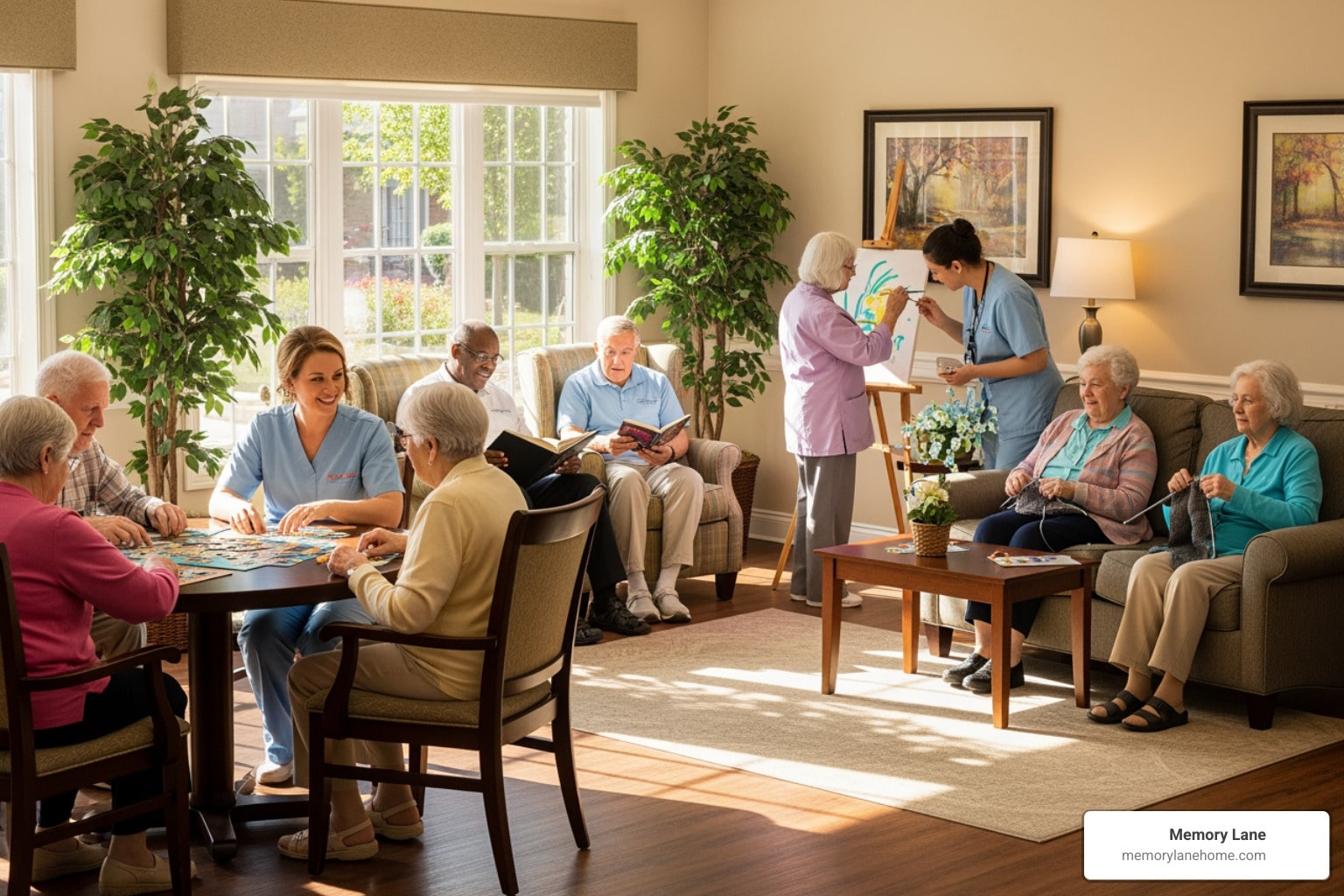Your guide to assisted living Michigan: explore costs, services, financial aid, and top communities for senior care.

Discover Affordable Dementia Nursing Homes in Michigan
Table of Contents for Affordable Dementia Care in MichiganTable Of Contents:
- Affordable Dementia Nursing Homes in Michigan: Key Insights and Options
- Key Takeaways
- Key Insights on Affordable Dementia Nursing Homes in Michigan
- Factors Affecting the Cost of Dementia Care in Michigan
- Exploring Financial Assistance Options for Dementia Care
- Types of Affordable Dementia Care Services in Michigan
- Evaluating the Quality of Affordable Dementia Care Facilities
- Resources for Finding Affordable Dementia Care
- Legal and Regulatory Considerations for Dementia Care
- Insights Into Affordable Dementia Care Trends in Michigan
- Frequently Asked Questions
- Conclusion
Affordable DementiaNursing Homes in Michigan: Key Insights and Options
Are affordable dementianursing homes in Michigan truly accessible for families seeking quality care? This post breaks down key insights by outlining cost factors and exploring financial assistance options for dementia care. Readers will learn how to evaluate care quality and find services that meet the needs of loved ones with Alzheimer’s or dementia. The content targets families facing mounting costs and uncertain options, offering clear guidance on finding affordable dementianursing homes in Michigan.
Key Takeaways
- memory lane assisted living bridges care between adult foster care, memory care, and the comforts of home
- personalized care plans focus on specialized dementia support and daily living skills
- regional programs ensure accessibility and responsiveness to local needs
- funding options and support networks help manage care costs effectively
- community-based initiatives improve social interactions and resident safety
Key Insights on Affordable DementiaNursing Homes in Michigan

Affordable dementianursing homes in Michigan offer reliable care that integrates therapy sessions tailored to improve cognition and overall well-being. The facilities provide structured plans that support both memory and daily living skills.
The availability of care varies by zip code across Michigan, ensuring that services reach a broad spectrum of residents. Each home is mindful of local needs and accessibility for families within specific community areas.
Many facilities focus on achieving equity by offering balanced access to skilled care and engaging therapy programs. Residents benefit from a care model that values fairness and regular assessments of cognition.
Quality care is maintained through dedicated organization frameworks that uphold high standards. The organization ensures that every resident receives support aligned with personalized therapy and cognition-building activities.
The analysis uncovers the real numbers behind affordable dementianursing homes in Michigan. The following section examines what drives the costs in dementia care across the state.
Factors Affecting the Cost of Dementia Care in Michigan
This section reviews pricing models for dementia care by comparing assisted living options, structured therapy sessions, and music therapy. It outlines cost differences, including meals on wheels services, and examines income variations across regions like Wisconsin. The content offers practical insights into care costs, facility comparisons, and regional pricing variability for affordable dementianursing homes in Michigan.
Understanding Pricing Models for Dementia Care
Understanding pricing models for dementia care involves closely examining various charges, including room fees, care services, and specialized nutrition. Experts note that facilities balance fixed costs with flexible options such as a waiver for additional services, similar to approaches seen in South Carolina settings, ensuring affordability and stability for families seeking a place for mom.
Facility administrators stress that pricing is influenced by personalized care needs and geriatrics support requirements, which can vary widely by region. They offer practical insights based on direct experience, advising families to inquire about detailed nutrition plans and service waivers, which play an important role in managing care costs effectively.
Comparing Care Costs Between Facility Types
The comparison between various facility types highlights differences in care costs and service quality, where ombudsman oversight and health professional evaluations play a central role in ensuring resident safety and well-being. Facility types that integrate structured shower routines and daily assistance programs often show higher costs but offer added value through personalized care and regular assessments of risk.
Direct experience from facility administrators reveals that residents in homes with comprehensive evaluation services tend to receive tailored assistance suited to their needs. Emphasis on care quality often results in pricing adjustments that account for enhanced protections during daily routines, making it essential for families to seek insights from a dedicated health professional when reviewing their options.
Variability of Prices Across Different Regions
Regional differences in care costs are apparent as facilities adjust pricing based on local economic factors. In some areas, factors such as weight loss and proper eating routines are considered when tailoring meal programs, while adjustments in medication expenses are noted across regions including Wyoming, ensuring managed care provides practical solutions for diverse community needs.
Variability in pricing also reflects differences in resident support levels and service routines. Community administrators report that areas with higher managed care standards often incorporate specialized therapy and nutritional programs to improve outcomes in weight loss and medication management, thereby offering adaptable care that meets local expectations and requirements.
Costs drive hard choices. Next, a look at aid reveals paths to ease the burden.
Exploring Financial Assistance Options for Dementia Care

This section outlines Medicaid support, alternative funding, and nonprofit aid for dementia care in southeast michigan. It explains how programs backed by the university of michigan and supportive community centers like the courtyard focus on compassion and ensure quality inspection. Practical options leave families more prepared to manage care expenses effectively.
Overview of Medicaid Support for Dementia Care
Medicaid support for dementia care assists residents in memory care facilities and residential care settings by securing access to essential primary care and specialist expertise. This program ensures that applicants can retain their rights while benefiting from coordinated efforts by a reputable nonprofit organization and state resources:
Policymakers and facility administrators highlight Medicaid support as a vital resource for families seeking comprehensive dementia care in Michigan. They provide actionable insights that help connect residents with the right combination of memory care facilities and residential care options to manage day-to-day activities and health needs effectively.
Alternative Funding Sources and Grants
Alternative funding sources and grants offer valuable opportunities for families seeking affordable care in Michigan. With first-hand knowledge of the challenges in planning property tax expenses and maintaining hygiene standards, administrators advise applying for grants that support both the memory care facility and the overall care landscape.
Facility experts highlight practical examples from similar care settings and share actionable insights:
This table illustrates funding options that provide effective support for affordable dementia nursing homes across Michigan.
Nonprofit Organizations Aid in Financial Support
Nonprofit organizations provide valuable financial support that assists affordable dementianursing homes in Michigan. Their expertise helps these facilities manage fire safety standards, life insurance procedures, inflation challenges, payroll issues, and brain health programs to improve operational stability and quality care:
- Assistance with fire safety improvements
- Guidance on life insurance processes
- Strategies to counter inflation effects
- Support with payroll management
- Programs to boost brain health initiatives
Financial support offered by these organizations ensures that facility administrators have actionable insights to address costs effectively while meeting care needs. Their contributions offer practical solutions that resonate well with families and stakeholders seeking clarity and reliability in managing financial challenges.
Finding ways to ease costs reveals real struggles and hope. Readers now see how affordable dementia care unfolds in Michigan.
Types of Affordable Dementia Care Services in Michigan

Michigan offers various affordable dementia care solutions. Memory care services provide essential in-home care for tailored dementia-care support. Adult day care services offer social interaction with registered nurse oversight to manage behavior, while specialized assisted living facilities deliver focused support for complex needs. These insights guide families interested in practical, comprehensive care options.
Overview of in-Home Care Services for Dementia Patients
In-home care services for dementia patients offer a practical solution that meets the needs of families seeking affordable options in Michigan while keeping the cost of living in mind. Facility experts note that these services help families manage cash flow and adapt to financial challenges such as adjustments in mortgage payments and variations noted in Illinoisemployee benefits:
The professional approach to in-home dementia care focuses on practical support with clear, actionable advice to help families cope with everyday financial pressures while ensuring high-quality care. Facility specialists offer insights based on direct experience, emphasizing that a well-structured plan, including attention to employee benefits, plays a key role in maintaining overall stability.
Adult Day Care Services for Social Interaction
Adult Day Care Services for Social Interaction provide safe environments that help alleviate confusion and isolation faced by many individuals with dementia. The program prioritizes engaging activities that promote social connections, supported by expert staff who assist residents in navigating price concerns and managing poverty challenges:
- Regular social gatherings
- Interactive wellness sessions
- Practical support similar to local food bank initiatives
- Guidance that reflects practices seen in Indiana
These services offer practical benefits by reducing stress and providing structured interactions that strengthen community ties. Facility experts note that while maintaining affordability, the day care centers deliver personalized support that addresses common issues such as confusion and financial worries, ensuring residents feel secure and connected.
Specialized Assisted Living Facilities for Dementia Care
Specialized assisted living facilities for dementia care in Michigan provide focused health care and caregiver support while offering affordable nursing and home care options. These facilities use a person-centered approach that has shown practical results in improving residents’ daily routines and cognitive function:
Facility administrators at memorylanehome.com offer actionable insights into these specialized assisted living services, noting that caregiver involvement is critical for maintaining high quality care. Their direct experience supports the importance of aligning affordable home care services with comprehensive health care and nursing practices to reduce common challenges in dementia care.
Michigan offers budget care options that place people at the center. The next part takes a closer look at how these facilities perform in real life.
Evaluating the Quality of Affordable Dementia Care Facilities

Evaluating quality in affordable dementia care facilities involves key factors to consider when choosing care options. Assessing state inspections and nursing home ratings reveals service safety and memorystimulation levels while family reviews provide insights into energy and support quality, offering a practical guide for selecting reliable care.
Key Factors to Consider When Choosing Care Options
Facility administrators observe that a well-defined policy on resident care is an important asset when evaluating affordable dementianursing homes in Michigan. They stress that consistent accessibility to essential services, including first aid and regular socialization activities, directly impacts both resident safety and overall satisfaction.
Experts note that careful consideration of care options requires evaluating how well each facility integrates clear policies with practical measures that support daily living. Practical examples from senior care settings reveal that consistent socialization programs and reliable first aid access are significant factors that enhance the overall asset value of the facility.
Understanding State Inspections and Facility Ratings
State inspections and facility ratings offer a clear snapshot of how well affordable dementia nursing homes manage their programs and services. These assessments highlight the reliability of memory-care-services and provide reassurance to family caregivers, ensuring that recommended criteria are met while keeping stress levels low. Facility administrators in Michigan note that similar protocols in North Dakota serve as a benchmark for maintaining safety standards and consistent care.
Expert evaluations during state inspections offer actionable insights that inform family caregivers about the quality of a dementia facility before making a commitment. The rigorous ratings system allows providers to address concerns about dementia care, reducing stress among families and ensuring that memory-care-services are executed according to practiced standards, as observed in notable establishments across North Dakota.
Importance of Family Reviews and Feedback
Family reviews provide essential insight into alzheimers-care quality, offering real examples of how facilities manage activities of daily living and overall resident well-being in affordable nursing homes in Michigan, including in the Fort Gratiot area; these reviews also discuss the practical aspects of estate planning and personal aid.:
Family feedback plays a vital role in evaluating the overall quality of affordable dementia care facilities, as it reflects firsthand experiences that guide future residents and their families in decision-making. Their shared insights on alzheimers-care, estate planning, and daily living support aid in forming a comprehensive picture of the reliable care options available in the Fort Gratiot region.
Quality reviews set the stage. The next part guides readers to clear paths for finding affordable dementia care.
Resources for Finding Affordable Dementia Care
This section offers listings of care providers in Michigan, support networks for dementia families, and educational opportunities for caregivers. It covers practical aspects like regulatory affairs, nutrition education, supplemental security income, art therapy, and legal aid to guide residents and their families through available options and expert advice, ensuring informed and balanced decision-making.
Listings of Care Providers in Michigan
Listings of care providers in Michigan offer a range of affordable options that emphasize propertysafety and personalized attention to detail. Facility administrators share firsthand expertise on how a reliable physician and balanced diet program play key roles in ensuring the wellness of residents in the Kent region:
- Provider network information influenced by local property standards
- Guidance on seeking regular physician check-ups
- Advice on managing dietary plans for optimal health
- Direct insights into securing care services in Kent
Practical examples from experienced administrators indicate that gathering listings of providers helps families navigate various care options with clarity and confidence. These listings empower readers to assess available property details, understand the importance of continuous attention, and align care plans that include support from knowledgeable physicians and effective diet programs.
Support Networks for Families of Dementia Patients
Families of dementia patients in Michigan benefit from extensive support networks that offer respite care options, a well-managed careratio, and access to a comprehensive database of local service providers. The clear emphasis on reducing stress and maintaining quality of life for residents with the disease inspires confidence in affordable dementianursing homes throughout the state.
Professional insights from facility administrators highlight practical strategies such as leveraging tax credit programs and connecting with expert groups dedicated to balance patient care needs. These support networks provide essential resources to help families navigate the challenges of managing daily demands and ensuring reliable care for those with the disease.
Educational Opportunities for Caregivers
Educational programs provide caregivers with practical research-based strategies to manage the challenges of dementia care. These courses offer actionable insights into creating a healthy diet plan and managing daily meal routines while integrating medicaid guidelines to ensure quality support.
Specialized training opportunities emphasize skill development in financial planning and staff management, including aspects of sick leave policies to sustain workforce morale and consistency. The following training aspects illustrate the key components of these educational sessions:
- Research techniques for effective care evaluation
- Strategies for balanced meal preparation and healthy diet planning
- Guidance on medicaid recommendations and policy updates
- Approaches to manage staff sick leave and maintain operational stability
Affordability matters, and often the way care is delivered depends on rules set by law. Now, the focus shifts to the rights and guidelines that shape dementia care.
Legal and Regulatory Considerations for Dementia Care
This section outlines residents’ rights in care, including Ottawa guidelines on fee accountability, foster care considerations, and health insurance regulations. It details state rules for dementia care and reporting processes for neglect or abuse while highlighting physical therapy requirements, providing practical insights for affordable dementianursing care in Michigan.
Understanding Rights of Residents in Care Facilities
Resident rights in care facilities safeguard the dignity of individuals while ensuring that each memory care unit maintains a valid license to provide quality elderly care, particularly for those managing an allergy or other health conditions:
- Clear legal guidelines for service delivery
- Regular oversight of memory care units
- Protection of residents’ dignity and elderly care standards
Facility administrators use first-hand expertise to navigate legal and regulatory considerations, ensuring that every resident receives consistent elderly care and support. They provide actionable insights based on practical experiences, which help families understand important measures related to license compliance and allergy management.
Overview of State Regulations for Dementia Care
State regulation for dementia care in Michigan is enforced by the michigan department of health and human services, which requires that every affordable nursing home adhere to strict guidelines to ensure a safe bathroom environment and overall quality of life for residents. Facility administrators provide practical examples of how proper credit and consistent oversight improve care operations and build trust among families.
Regulation standards are regularly updated to address common challenges, such as optimizing bathroomaccessibility and maintaining high-quality service delivery. Experts note that thorough inspections and actionable insights from the michigan department of health and human services help facility staff adjust practices, ensuring that quality of life remains a priority while managing credit effectively in budget planning.
Reporting Mechanisms for Neglect or Abusive Practices
Facility administrators implement clear reporting mechanisms for neglect or abusive practices, drawing on the expertise of an experienced expert and a veteran in the field. They provide practical guidance on addressing concerns within memory care homes, ensuring that every village member and family in areas like Grosse Pointe receives the needed protection and support.
Local professionals in affordable dementianursing homes support the use of reporting channels to resolve issues in care standards. They advise families to engage with trusted experts and veteran administrators who work within the village framework, thereby reinforcing accountability in every memory care home in Grosse Pointe.
Legal and Regulatory Considerations for Dementia Care have set a firm foundation for care standards. Affordable trends in Michigan now offer fresh insights into easing care costs and improving lives.
Insights Into Affordable Dementia Care Trends in Michigan
Current trends show evolving patient care at memory care homes using tools like a power of attorney and updated insurance policy guidance for retirement planning. Future projections indicate more affordable care options, while community programs significantly impact patient support. This section offers practical insights into these areas, outlining key trends and future projections for affordable dementia care in Michigan.
Current Trends in Dementia Care Facilities
The landscape of dementia care facilities in Michigan shows a focus on personalized care plans that incorporate structured daily routines and professional support. Facility administrators emphasize that modern trends center on tailored solutions designed to address the unique needs of each resident, offering practical examples of how adjusted care protocols improve daily living.
Innovative practices in affordable dementianursing homes continue to emerge as facilities integrate community-based support and personalized attention into their care models:
Current practices in affordable dementia care demonstrate a commitment to integrating professional expertise with community support, offering practical insights and actionable steps for families seeking dependable care. Facility experts note that these trends not only improve cognitive support but also ensure that residents enjoy a safe and engaging environment tailored to their individual needs.
Future Projections for Affordable Care Options
Future projections in affordable care options indicate a steady increase in personalized programming that aligns with evolving resident needs. Facility experts note that tailored care plans and community-based support networks are expected to shape the future of affordable dementianursing homes in Michigan.
Anticipated trends suggest that technological integration and continuous staff training will further improve care quality while maintaining cost efficiency. Administrators share actionable insights from direct experiences, emphasizing that structured routines and dedicated care teams are set to enhance the overall resident experience.
Impact of Community Programs on Dementia Support
Community programs in Michigan play a significant role in supporting dementia care by building a network of practical services that ease daily challenges. Experts at Memory Lane Assisted Living note that these programs offer family-centered support and create opportunities for routine social interaction, which help improve overall resident well-being.
Local initiatives offer tailored activities and resource centers that address common concerns in dementia care, ensuring residents receive focused personal attention. Facility administrators observe that community-led efforts contribute to a more engaged environment, providing clear and practical insights that alleviate stress for both residents and their families.
Frequently Asked Questions
What makes dementia care costs vary in Michigan?
Dementia care costs in Michigan vary due to facility location, care level, and specialized services. Memory Lane Assisted Living offers a personal approach that helps meet unique needs through tailored support and experienced staff.
How can I find financial help for dementia care?
Memory Lane Assisted Living recommends reaching out to local community agencies, nonprofit organizations, and state programs supporting affordable dementia care. They can provide information on insurance coverage, grants, and other financial assistance options.
What types of affordable services exist for dementia care?
Affordable dementia care options include personalized memory care services in small residential settings that prioritize person-centered approaches with supportive staff, making specialized care accessible for individuals with Alzheimer’s and other related conditions.
How is quality evaluated in dementia care facilities?
Quality in dementia care facilities is evaluated using staff responsiveness, personalized care plans, compliance with safety standards, and resident feedback, reflecting a commitment to specialized memory care and a home-like environment.
What legal issues affect dementia care affordability in Michigan?
Legal challenges such as Medicaid eligibility rules, estate planning requirements, and guardianship disputes affect dementia care affordability in Michigan. Coverage limitations and regulatory constraints also influence costs in specialized assisted living facilities.
Conclusion
Affordable dementianursing homes in Michigan offer essential care that balances professional expertise with personalized support. They provide clear, practical strategies for managing costs and addressing individual resident needs. Facilities deliver tailored care routines that enhance wellness and improve daily living. This topic remains highly relevant, offering actionable insights for families seeking reliable and compassionate care solutions in their communities.


